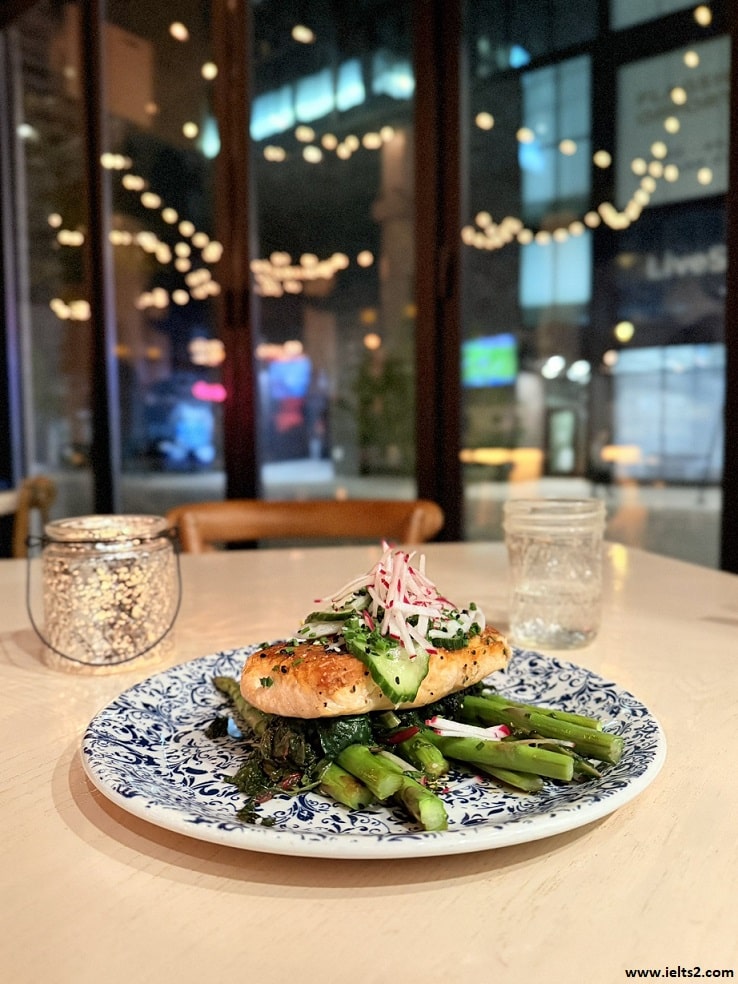نمونه سوالات اسپیکینگ آیلتس درباره غذا (نمره 9)
IELTS Speaking Questions with Band 9 Answers about Food
در این بخش بیش از 20 مورد از نمونه سوالات اسپیکینگ آیلتس نمره 9 از آخرین سوالات گزارش شده از سنترهای ایرانی و خارجی برگزار کننده آیلتس مربوط به پارت 1، 2 و 3 درباره تاپیک “غذا” را برای شما فهرست کرده ایم. در ادامه همچنین نکات گرامری، لغات و دلایل دریافت نمره 9 را توضیح داده ایم. 1000 نمونه سوالات اسپیکینگ آیلتس با جواب PDF پارت 1 2 3 پیشنهاد بعدی ما به شما عزیزان است.
نمونه سوالات اسپیکینگ آیلتس درباره تاپیک غذا (پارت 1)
IELTS Speaking Part 1: Questions and Band 9 Answers on Food
1. What kind of food do you like?
I enjoy a wide variety of cuisines, but my favorite is Mediterranean food. It’s both flavorful and healthy, with ingredients like olive oil, fresh vegetables, and grilled seafood. Dishes such as hummus and tzatziki are simple yet incredibly delicious. I also appreciate how Mediterranean meals emphasize balance and freshness, making them satisfying without being overly heavy.
2. Do you prefer eating at home or dining out?
I usually prefer eating at home because it allows me to control the ingredients and prepare healthier meals. Home cooking also feels more personal and rewarding. However, dining out occasionally is enjoyable, especially when trying new cuisines or celebrating special occasions. It’s a great way to experience different culinary styles.
3. How often do you eat fast food?
I rarely eat fast food because I prioritize health and nutrition. While fast food is convenient, it often lacks the essential nutrients a balanced diet requires. That said, I don’t completely avoid it and might indulge once in a while, especially when I’m traveling or short on time.
4. What is your favorite traditional food in your country?
My favorite traditional dish is kebab, which is grilled, marinated meat served with rice or bread. It’s flavorful, aromatic, and deeply rooted in our culinary culture. The spices and cooking methods make it unique, and it’s often associated with family gatherings and festive occasions, adding to its charm.
5. Do you like cooking?
Yes, I genuinely enjoy cooking as it’s both therapeutic and creative. Experimenting with different ingredients and techniques allows me to craft meals tailored to my taste. It’s also a great way to connect with others, as sharing homemade food brings people together and creates lasting memories.
6. Is there any food you dislike?
I’m not particularly fond of overly spicy food. While I appreciate the bold flavors of certain cuisines, extreme spiciness can overshadow other tastes and make the meal less enjoyable. That said, I’m open to mild spice levels when balanced with other flavors.
7. Do you think people’s eating habits have changed over time?
Absolutely, eating habits have evolved significantly. In the past, people primarily consumed home-cooked meals using fresh ingredients. Nowadays, busy lifestyles have led to increased reliance on convenience foods and dining out. However, there’s also a growing trend toward healthier, plant-based diets as people become more health-conscious.
8. What’s the most unusual food you’ve ever tried?
The most unusual food I’ve tried is raw octopus during a trip to Japan. It was chewy with a slightly briny taste. While it wasn’t something I’d eat regularly, I appreciated the cultural experience and admired the freshness of the seafood.
9. Do you think food is important in celebrations?
Yes, food plays a central role in celebrations as it brings people together and reflects cultural traditions. Special dishes are often prepared to mark significant occasions, such as wedding feasts or holiday meals. Sharing food enhances the sense of community and makes events more memorable.
10. Do you prefer sweet or savory food?
I lean toward savory food as I enjoy bold and complex flavors. Dishes like roasted vegetables, grilled meats, and herb-infused pastas are satisfying and versatile. While I occasionally indulge in desserts, savory foods are my go-to choice for everyday meals.
نمونه سوالات اسپیکینگ آیلتس درباره تاپیک غذا (پارت 2)
در اینجا یک نمونه سوالات اسپیکینگ آیلتس پارت 2 درباره تاپیک غذا را با هم میبینیم. در این بخش شرکت کننده میتواند 1 دقیقه خود را برای ارایه پاسخ آماده کند و به مدت 2 دقیقه به سوال مشخص شده پاسخگو باشد:
Describe a special meal you enjoyed. You should say:
What the meal was
Where you had it
Who you were with
And explain why it was special to you.
Model Answer (Band 9):
One of the most memorable meals I’ve ever had was a traditional seafood dinner during a trip to a coastal town in southern Italy. The meal, served at a small, family-run restaurant overlooking the sea, consisted of freshly caught fish, shrimp, and calamari, accompanied by homemade pasta with a rich tomato and basil sauce. The ingredients were exceptionally fresh, as they had been sourced directly from the local market that morning.
I shared this meal with my closest friends, making the experience even more meaningful. We had spent the day exploring the picturesque streets and relaxing by the beach, so the dinner felt like the perfect culmination of an already wonderful day. The atmosphere was warm and inviting, with the owners personally serving us and sharing stories about their culinary traditions.
What made this meal particularly special was not just the exceptional taste of the food but the combination of factors surrounding it. The location, with its stunning view of the sunset over the ocean, created a serene and magical ambiance. Moreover, the act of sharing such a delightful experience with people I care about deeply strengthened our bond.
This meal stands out in my memory because it wasn’t just about satisfying hunger—it was an immersive cultural and emotional experience. It reminded me of the importance of appreciating simple yet profound pleasures, such as good food, beautiful surroundings, and meaningful connections with others.

نمونه سوالات اسپیکینگ آیلتس درباره تاپیک غذا (پارت 3)
در پارت سوم سوالات دشوار تر هستند و برای پاسخ به آن ها باید آمادگی بیشتری از نظر سطح لغات و گرامر داشت. در اینجا نمونه سوالات اسپیکینگ رایج در پارت سوم برای تاپیک غذا را با هم میبینیم:
IELTS Speaking Part 3 Questions on Food with Band 9 Model Answers
1. Why do people eat fast food instead of home-cooked meals?
Many people opt for fast food due to its convenience and time-saving nature. In today’s fast-paced world, preparing home-cooked meals can be time-consuming, especially for working professionals. Fast food is also widely accessible and often marketed attractively. However, this choice is usually driven by short-term convenience rather than long-term health considerations. People often overlook the nutritional deficiencies and potential health risks associated with fast food consumption, such as obesity or heart disease. Additionally, the affordability of fast food in comparison to fresh, organic ingredients makes it a popular choice, particularly for those on a tight budget. Despite these advantages, the long-term consequences of such dietary habits underscore the importance of promoting healthier eating alternatives, which can provide both nutritional value and enjoyment without compromising convenience.
2. How have eating habits changed over the last few decades?
Eating habits have undergone significant changes due to globalization, technology, and lifestyle shifts. Traditional diets, often based on locally sourced ingredients, have given way to diverse cuisines as international food chains expand. Additionally, modern lifestyles emphasize convenience, leading to an increase in pre-packaged meals and dining out. Technological advancements, such as food delivery apps, have further revolutionized how people access meals. Health consciousness has also grown, with more individuals adopting plant-based diets or focusing on nutritional balance. Conversely, the consumption of processed foods has risen, partly due to busy schedules. While these changes reflect societal progress, they also highlight challenges, such as the decline in home cooking and its impact on family bonding. Ultimately, adapting to these trends while maintaining cultural and nutritional values is crucial for ensuring a balanced approach to eating habits.
3. Should governments regulate the food industry more strictly?
Governments should enforce stricter regulations on the food industry to safeguard public health. Many processed foods are laden with sugar, salt, and unhealthy fats, contributing to rising obesity rates and chronic diseases. By mandating clear labeling, limiting harmful additives, and taxing unhealthy foods, governments can promote healthier choices. Additionally, subsidies for fresh produce and public education campaigns can encourage balanced diets. Critics may argue that such measures infringe on personal freedom, but the broader benefits to public health outweigh these concerns. Furthermore, addressing food waste and ensuring ethical practices in food production are essential components of stricter regulation. By prioritizing health and sustainability, governments can not only reduce healthcare costs but also improve overall quality of life for their citizens.
4. What role does culture play in the food people eat?
Culture profoundly influences dietary preferences, preparation methods, and mealtime traditions. For example, Mediterranean cuisines emphasize fresh ingredients like olive oil and fish, reflecting the region’s climate and history. Similarly, festivals and religious practices shape food choices; for instance, Indian cuisine varies between vegetarian dishes during religious observances and meat-based curries in other contexts. Beyond ingredients, cultural norms dictate how meals are consumed, with some societies valuing communal dining while others focus on quick, individual meals. As globalization spreads, traditional cuisines often evolve to incorporate foreign influences, yet cultural identity remains evident in food. Preserving culinary traditions is vital for maintaining heritage while embracing global trends, as food acts as a bridge connecting past, present, and future generations.
5. Why is food waste a significant issue today?
Food waste has become a pressing global issue due to overproduction, inefficient supply chains, and consumer habits. A significant portion of food is discarded during harvesting, transportation, and retail due to imperfections or overstocking. At the consumer level, excessive portion sizes and improper storage lead to spoilage. This waste not only squanders resources like water and energy but also exacerbates climate change by producing methane in landfills. Addressing food waste requires collective action, such as promoting food redistribution initiatives, improving storage technologies, and raising public awareness. Governments can play a pivotal role by implementing policies that incentivize waste reduction, such as tax benefits for donating surplus food. Ultimately, tackling food waste benefits both the environment and global food security, making it an ethical and economic imperative.
6. What is the impact of globalization on food?
Globalization has significantly diversified food options, introducing people to international cuisines and ingredients. While this fosters cultural exchange and culinary innovation, it also leads to the homogenization of traditional diets, with processed and fast foods becoming more prevalent. This shift can contribute to health issues, such as obesity, in regions unaccustomed to high-calorie diets. Moreover, globalization increases dependency on imported goods, which may harm local agriculture and disrupt food security. On the positive side, global trade enables access to seasonal or exotic ingredients year-round, enhancing culinary creativity. To balance these effects, promoting sustainable practices and supporting local food systems is essential. By celebrating diversity while preserving heritage, societies can reap the benefits of globalization without losing their culinary identity.
7. How can individuals adopt healthier eating habits?
Adopting healthier eating habits begins with education about nutrition and the impact of food choices. Individuals can prioritize whole, minimally processed foods, including fruits, vegetables, and lean proteins. Meal planning and preparation reduce reliance on convenience foods, while mindful eating helps avoid overeating. Additionally, drinking water instead of sugary beverages and limiting salt and sugar intake are simple yet effective steps. Governments and schools can support these efforts through public campaigns and incorporating nutrition into educational curriculums. Ultimately, consistency is key; small, sustainable changes are more effective than drastic diets. By embracing healthier practices, individuals can improve their physical and mental well-being, creating a foundation for a balanced lifestyle.
8. What is the role of technology in shaping modern eating habits?
Technology plays a transformative role in modern eating habits, streamlining access to diverse cuisines through food delivery apps and online platforms. Social media influences trends, with influencers promoting specific diets or recipes. Smart kitchen appliances, such as air fryers or meal planners, enable healthier cooking. Technology also fosters transparency, allowing consumers to check nutritional content and ethical sourcing of products. However, over-reliance on convenience technologies may lead to reduced cooking skills and reliance on processed foods. To harness technology positively, integrating it with educational tools that encourage informed choices is vital. This balance ensures that technological advancements contribute to healthier, more sustainable eating habits.
9. Should children learn about cooking and nutrition at school?
Teaching cooking and nutrition in schools is vital for fostering lifelong healthy habits. Practical lessons on meal preparation and understanding nutritional labels empower children to make informed choices. Early exposure to diverse cuisines and balanced diets can prevent future health issues, such as obesity or diabetes. Moreover, cooking classes encourage creativity and teamwork, enhancing social and cognitive skills. Critics may argue that schools should focus on academic subjects, but integrating nutrition into curriculums benefits overall well-being. By instilling these skills early, children develop independence and responsibility, ensuring they grow into adults capable of maintaining a healthy lifestyle.
10. How does socioeconomic status influence dietary choices?
Socioeconomic status (SES) significantly affects dietary choices, as income levels often dictate access to fresh and nutritious food. Lower SES individuals may rely on inexpensive, processed foods due to affordability and limited access to grocery stores. Conversely, higher SES groups often prioritize organic or specialty diets, reflecting greater health awareness and financial means. Education also plays a role; informed individuals are likelier to make healthier decisions. Addressing these disparities requires systemic change, such as subsidizing healthy food options and improving access to nutritional education. By bridging the gap, societies can ensure equitable access to nutritious diets for all.
Factors Contributing to Band 9
Grammar:
- Complex Sentences – Add sophistication and coherence.
- Passive Voice – Formal tone, emphasizes subject.
- Parallel Structures – Clarity and fluency.
- Relative Clauses – Specificity and detail.
- Conditionals – Highlight possibilities and logical reasoning.
Vocabulary:
- Academic words (e.g., incentivize, homogenization).
- Precise and varied synonyms.
- Topic-specific terms (nutrition, biodiversity).
- Collocations (balanced diet, processed foods).
- Formal tone throughout.
These elements ensure fluency, coherence, and sophistication, critical for Band 9.
تعیین سطح رایگان اسپیکینگ ❤️
نمونه سوالات اسپیکینگ آیلتس درباره تاپیک غذا پارت 1 2 3 را به همراه سمپل های نمره 9 آن ها با هم دیدیم. در ادامه نمونه سوالات دسته بندی شده اسپیکینگ آیلتس در یکی از سایت های خارجی قابل اعتماد پیشنهاد آخر ما به دوستان گرامی هست. در همین سایت سوالات اسپیکینگ آیلتس تاپیک غذا را هم خواهید یافت. این نمونه سوالات اسپکینگ از پرتکرار ترین تاپیک های این بخش و همچنین جدیدترین موضوعات می باشند. این مجموعه توسط یکی از سایت های معتبر و فعال آیلتس تنظیم شده است. همچنین برای تعیین سطح و تعیین رایگان نمره اسپیکینگ و دریافت جدید ترین سمپل های نمره 9 در کانال تلگرام اسپیکینگ ما همراه باشید و به ادمین برای تعیین نمره اطلاع دهید.






